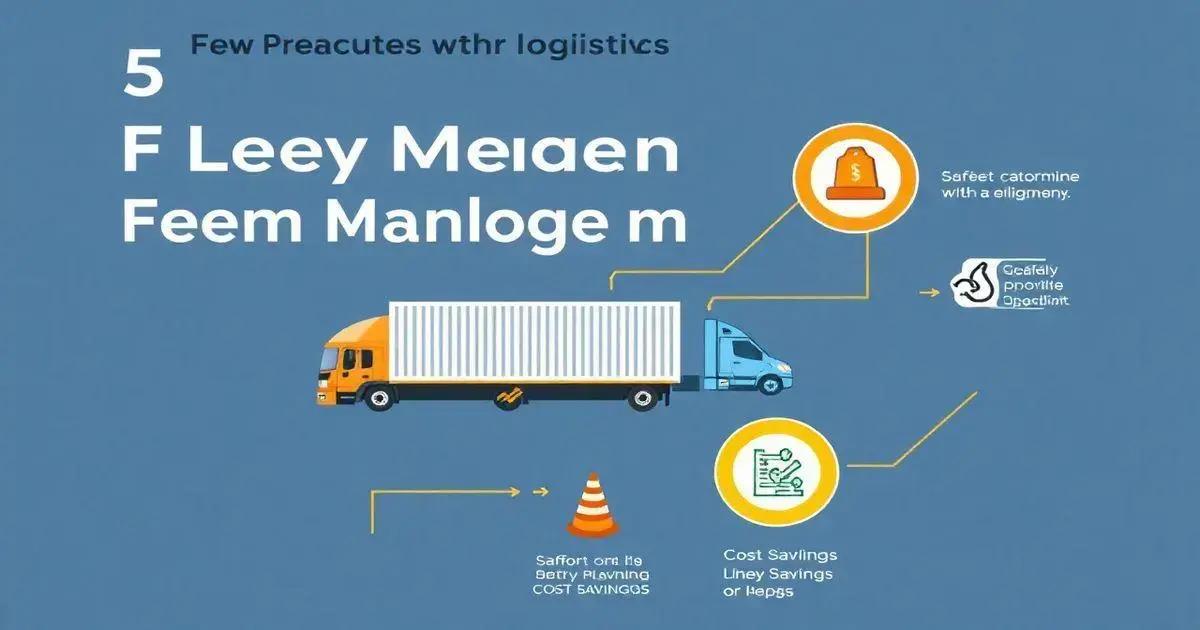5 Key Impacts of Fleet Management on Logistics Leave a comment
Fleet management is crucial for optimizing logistics by overseeing vehicle operations to enhance delivery efficiency, safety, and cost reduction. It addresses challenges like cost control and maintenance while leveraging technology for real-time monitoring and predictive maintenance. The future of fleet management emphasizes sustainability, data-driven decisions, and the integration of AI and automation to maintain a competitive edge.
Fleet management plays a crucial role in optimizing logistics operations. It involves overseeing the vehicles used by a business to ensure efficient delivery of goods. As the transportation sector continues to evolve, understanding the impacts of effective fleet management becomes increasingly important.
In this article, we will explore how fleet management affects safety, costs, and overall logistics performance, along with the challenges faced in this domain.
What is Fleet Management?
Fleet management refers to the comprehensive process of overseeing and coordinating the vehicles utilized by a company or organization to facilitate the delivery of products and services. It encompasses a variety of critical tasks aimed at ensuring that the fleet operates efficiently and effectively.
Key aspects of fleet management include:
- Vehicle Maintenance: Regular maintenance is essential to keep vehicles in optimal condition, reducing the likelihood of breakdowns and ensuring safety on the road.
- Performance Monitoring: Tracking the performance of each vehicle helps identify areas for improvement and ensures that the fleet operates at peak efficiency.
- Fuel Management: Efficient fuel management strategies can significantly reduce costs, including monitoring fuel consumption and exploring alternative fuel options.
- Regulatory Compliance: Adhering to local, state, and federal regulations is crucial. This includes maintaining proper documentation and ensuring all vehicles meet safety standards.
- Driver Safety: Implementing safety protocols and training programs for drivers is vital to minimize accidents and ensure the safety of both drivers and cargo.
- Route Optimization: Utilizing technology to plan and optimize delivery routes can lead to reduced travel time, lower fuel costs, and improved customer satisfaction.
In a rapidly changing transportation landscape, effective fleet management is essential for businesses looking to enhance operational efficiency, reduce costs, and improve service delivery.

Impact of Fleet Management on Safety and Costs
The impact of fleet management on safety and costs is profound and multifaceted. A well-implemented fleet management system not only enhances the safety of drivers and cargo but also leads to significant cost savings for the organization.
1. Enhancing Safety: Fleet management allows for the establishment of comprehensive safety policies and procedures. By monitoring driver behavior, such as speed and braking patterns, companies can identify risky practices and address them through training and corrective measures. Moreover, regular vehicle maintenance ensures that all fleet vehicles are in safe operating condition, reducing the risk of accidents caused by mechanical failures.
2. Reducing Accident Rates: With effective fleet management, companies can track performance metrics and implement safety technologies, such as GPS tracking and telematics. This data helps in analyzing accident trends, allowing managers to make informed decisions to improve safety protocols. As a result, organizations can experience a reduction in accident rates, leading to fewer insurance claims and lower liability costs.
3. Cost Control: Efficient fleet management directly correlates with cost savings. By optimizing routes and reducing fuel consumption, companies can significantly lower their operational expenses. Additionally, by minimizing accidents and vehicle downtime, organizations can avoid costly repairs and lost productivity.
4. Predictive Maintenance: Implementing a proactive maintenance schedule through fleet management tools helps in identifying potential issues before they escalate into costly repairs. This predictive approach not only extends the lifespan of vehicles but also ensures that they operate efficiently, further reducing costs associated with fuel and maintenance.
5. Insurance Premium Reduction: A demonstrable commitment to safety through effective fleet management can lead to lower insurance premiums. Insurance companies often reward businesses that can show a track record of safety and risk management, allowing for significant savings.
In summary, the impact of fleet management on safety and costs is substantial. By prioritizing safety measures and optimizing operational efficiencies, organizations can achieve a safer work environment while controlling and reducing costs associated with fleet operations.
Main Challenges in Fleet Management
Managing a fleet comes with its own set of challenges that can impact the efficiency and effectiveness of operations. Here are some of the main challenges in fleet management that organizations often face:
1. Cost Reduction: One of the primary challenges in fleet management is finding ways to reduce costs without compromising service quality. This includes managing expenses related to fuel, maintenance, insurance, and vehicle depreciation. Implementing cost-saving measures while maintaining operational standards can be a delicate balance.
2. Maintenance Control: Ensuring that all vehicles are properly maintained is crucial for operational efficiency. However, managing a maintenance schedule can be complex, especially for large fleets. Preventive maintenance is essential, but it requires careful planning and resources to avoid unexpected breakdowns and downtime.
3. Vehicle Monitoring: Keeping track of vehicle locations, usage, and performance is vital for effective fleet management. However, monitoring all vehicles in real-time can be challenging, especially for companies with a wide geographical reach. Implementing the right tracking technologies and ensuring they are used effectively can pose logistical hurdles.
4. Temperature Control: For companies that transport temperature-sensitive goods, maintaining the correct temperature during transit is a significant challenge. This requires specialized equipment and strict adherence to regulations, adding another layer of complexity to fleet management.
5. Accident Prevention: Ensuring the safety of drivers and cargo is paramount, yet accidents can still occur. Fleet managers must implement rigorous training programs and safety protocols to minimize risks. However, achieving a culture of safety among drivers can be difficult and requires ongoing effort and commitment.
6. Skilled Workforce: Having a well-trained and qualified team of drivers is essential for fleet success. However, recruiting and retaining skilled drivers can be a challenge, especially in a competitive labor market. Companies must invest in training and development to ensure their workforce meets operational demands.
7. Compliance and Regulations: Keeping up with local, state, and federal regulations can be daunting. Fleet managers must ensure that all vehicles comply with safety standards and that drivers adhere to regulations regarding hours of service and vehicle emissions. Non-compliance can result in fines and operational disruptions.
8. Visibility of Operations: Gaining a comprehensive view of fleet operations is crucial for informed decision-making. However, many fleet managers struggle with data integration and analysis. Implementing the right systems to provide real-time visibility can be a significant challenge.
In conclusion, fleet management involves navigating a variety of challenges that can impact safety, efficiency, and costs. By proactively addressing these issues, organizations can enhance their fleet operations and achieve better overall performance.

How Technology Can Help Overcome These Challenges
Technology plays a crucial role in addressing the challenges faced in fleet management. By leveraging advanced tools and systems, organizations can enhance efficiency, improve safety, and reduce costs. Here’s how technology can help overcome these challenges:
1. Real-Time Monitoring and Tracking: GPS tracking systems allow fleet managers to monitor vehicle locations and performance in real-time. This visibility enables better route planning, reduces travel time, and helps in responding quickly to any issues that arise during transit.
2. Fleet Management Software: Comprehensive fleet management software integrates various functionalities, including maintenance scheduling, fuel management, and driver performance tracking. These platforms streamline operations and provide valuable insights into fleet performance, making it easier to identify areas for improvement.
3. Predictive Maintenance: Advanced telematics systems can analyze vehicle data to predict when maintenance is needed. By identifying potential issues before they become serious problems, companies can minimize downtime and reduce maintenance costs, ensuring that vehicles are always in optimal condition.
4. Route Optimization Tools: Utilizing route optimization software helps in planning the most efficient delivery routes. These tools consider factors such as traffic patterns, road conditions, and delivery windows, leading to reduced fuel consumption and improved delivery times.
5. Driver Safety Technologies: Implementing technologies such as dash cameras and driver behavior monitoring systems can enhance safety. These tools provide real-time feedback to drivers, helping them improve their driving habits and reduce the likelihood of accidents.
6. Mobile Applications: Mobile apps enable drivers to access important information on the go, such as delivery schedules, route changes, and safety protocols. This accessibility ensures that drivers are well-informed and can make timely decisions during their routes.
7. Compliance Management Solutions: Technology can simplify compliance with regulations by automating documentation and reporting processes. Fleet management software can track hours of service, monitor vehicle inspections, and ensure that all vehicles meet safety standards.
8. Data Analytics: Leveraging data analytics allows fleet managers to analyze performance metrics and identify trends. By understanding patterns in fuel consumption, maintenance costs, and driver performance, organizations can make data-driven decisions to enhance fleet efficiency.
In summary, technology provides a robust solution to many of the challenges faced in fleet management. By embracing these innovations, organizations can improve safety, streamline operations, and achieve significant cost savings, ultimately leading to a more efficient and effective fleet.
Outsourcing Risk Management and Logistics Control
Outsourcing risk management and logistics control has become an increasingly popular strategy for organizations looking to enhance their fleet operations. By partnering with specialized service providers, companies can focus on their core competencies while benefiting from expert solutions. Here’s how outsourcing can help:
1. Access to Expertise: By outsourcing risk management, companies gain access to professionals who specialize in identifying, assessing, and mitigating risks associated with transportation and logistics. These experts have the knowledge and experience to implement effective strategies that can significantly reduce potential threats.
2. Enhanced Safety Measures: Specialized risk management firms can provide advanced safety protocols and training programs tailored to the specific needs of the fleet. This focus on safety can lead to a reduction in accidents and incidents, ultimately protecting both drivers and cargo.
3. Cost Efficiency: Outsourcing logistics control allows companies to leverage the resources and technologies of external providers, reducing the need for significant investments in in-house systems. This can lead to lower operational costs while maintaining high service levels.
4. Improved Compliance: Keeping up with ever-changing regulations can be challenging. Outsourcing firms often have dedicated compliance teams that ensure all operations adhere to local, state, and federal regulations. This reduces the risk of fines and penalties associated with non-compliance.
5. Focus on Core Business: By outsourcing these functions, organizations can concentrate on their primary business activities without the distraction of managing logistics and risk. This allows for better resource allocation and more strategic planning.
6. Scalability: Outsourcing provides the flexibility to scale operations up or down based on demand. This adaptability is particularly beneficial for companies that experience seasonal fluctuations in their logistics needs.
7. Advanced Technology Solutions: Many logistics providers utilize cutting-edge technology that may not be feasible for companies to implement on their own. By outsourcing, organizations can benefit from these advanced tools, such as real-time tracking, data analytics, and automated reporting.
8. Enhanced Visibility: Partnering with a logistics control provider can improve visibility across the supply chain. These providers often have systems in place that allow for real-time monitoring and reporting, enabling better decision-making and responsiveness to potential issues.
In conclusion, outsourcing risk management and logistics control can provide significant advantages for organizations looking to enhance their fleet operations. By leveraging the expertise and resources of specialized providers, companies can improve safety, reduce costs, and focus on their core business objectives, ultimately leading to a more efficient and effective operation.

Conclusion: The Future of Fleet Management
The future of fleet management is poised for transformation as technology continues to advance and the logistics landscape evolves. Organizations are increasingly recognizing the importance of adopting innovative solutions to enhance efficiency, safety, and cost-effectiveness in their fleet operations.
1. Embracing Technology: As technology becomes more integrated into fleet management, companies will need to embrace tools such as telematics, GPS tracking, and fleet management software. These technologies will enable real-time monitoring and data analysis, leading to more informed decision-making and improved operational performance.
2. Focus on Sustainability: With growing concerns about environmental impact, the future of fleet management will also focus on sustainability. Companies will explore alternative fuel sources, electric vehicles, and eco-friendly practices to reduce their carbon footprint and comply with stricter environmental regulations.
3. Enhanced Safety Measures: The emphasis on safety will continue to be a priority in fleet management. Future advancements may include more sophisticated driver monitoring systems, automated safety features in vehicles, and comprehensive training programs designed to promote safe driving practices.
4. Data-Driven Decision Making: As data analytics tools become more robust, fleet managers will increasingly rely on data-driven insights to optimize their operations. By analyzing patterns in vehicle performance, fuel consumption, and driver behavior, organizations can identify areas for improvement and implement strategies that enhance efficiency.
5. Flexible and Adaptive Operations: The future will demand greater flexibility in fleet operations. Companies will need to be agile, adapting to changing market conditions and customer demands. This may involve outsourcing certain functions or leveraging third-party logistics providers to scale operations as needed.
6. Integration of AI and Automation: The integration of artificial intelligence (AI) and automation will revolutionize fleet management. AI can enhance route optimization, predictive maintenance, and risk assessment, while automation can streamline processes, reduce human error, and improve overall efficiency.
In conclusion, the future of fleet management is bright, filled with opportunities for innovation and improvement. By embracing technology, prioritizing safety, and adapting to emerging trends, organizations can position themselves for success in an increasingly competitive landscape. As the industry evolves, those who proactively adopt these changes will likely lead the way in achieving operational excellence and sustainability in fleet management.
Conclusion
In conclusion, effective fleet management is vital for enhancing safety, reducing costs, and improving operational efficiency in the logistics sector.
By understanding the key impacts of fleet management, recognizing the challenges faced, and leveraging technology, organizations can create a more streamlined and effective fleet operation.
As we look to the future, the integration of advanced technologies, a focus on sustainability, and a commitment to safety will shape the evolution of fleet management.
Companies that embrace these changes will not only improve their operational performance but also gain a competitive edge in the marketplace.
Ultimately, prioritizing fleet management strategies will lead to better service delivery, increased customer satisfaction, and long-term success in the ever-evolving transportation industry.
FAQ – Frequently Asked Questions about Fleet Management
What is fleet management?
Fleet management refers to the comprehensive process of overseeing and coordinating a company’s vehicles to ensure efficient delivery of goods and services.
How does fleet management impact safety?
Effective fleet management enhances safety by implementing safety protocols, monitoring driver behavior, and ensuring regular vehicle maintenance to reduce accidents.
What are the main challenges in fleet management?
Key challenges include cost reduction, maintenance control, vehicle monitoring, compliance with regulations, and ensuring driver safety.
How can technology improve fleet management?
Technology improves fleet management through real-time tracking, fleet management software, predictive maintenance, route optimization, and enhanced safety measures.
What are the benefits of outsourcing risk management in fleet operations?
Outsourcing risk management provides access to expertise, enhances safety measures, improves compliance, reduces costs, and allows companies to focus on core business activities.
What does the future hold for fleet management?
The future of fleet management will focus on embracing technology, sustainability, data-driven decision making, and integrating AI and automation to enhance operational efficiency.

